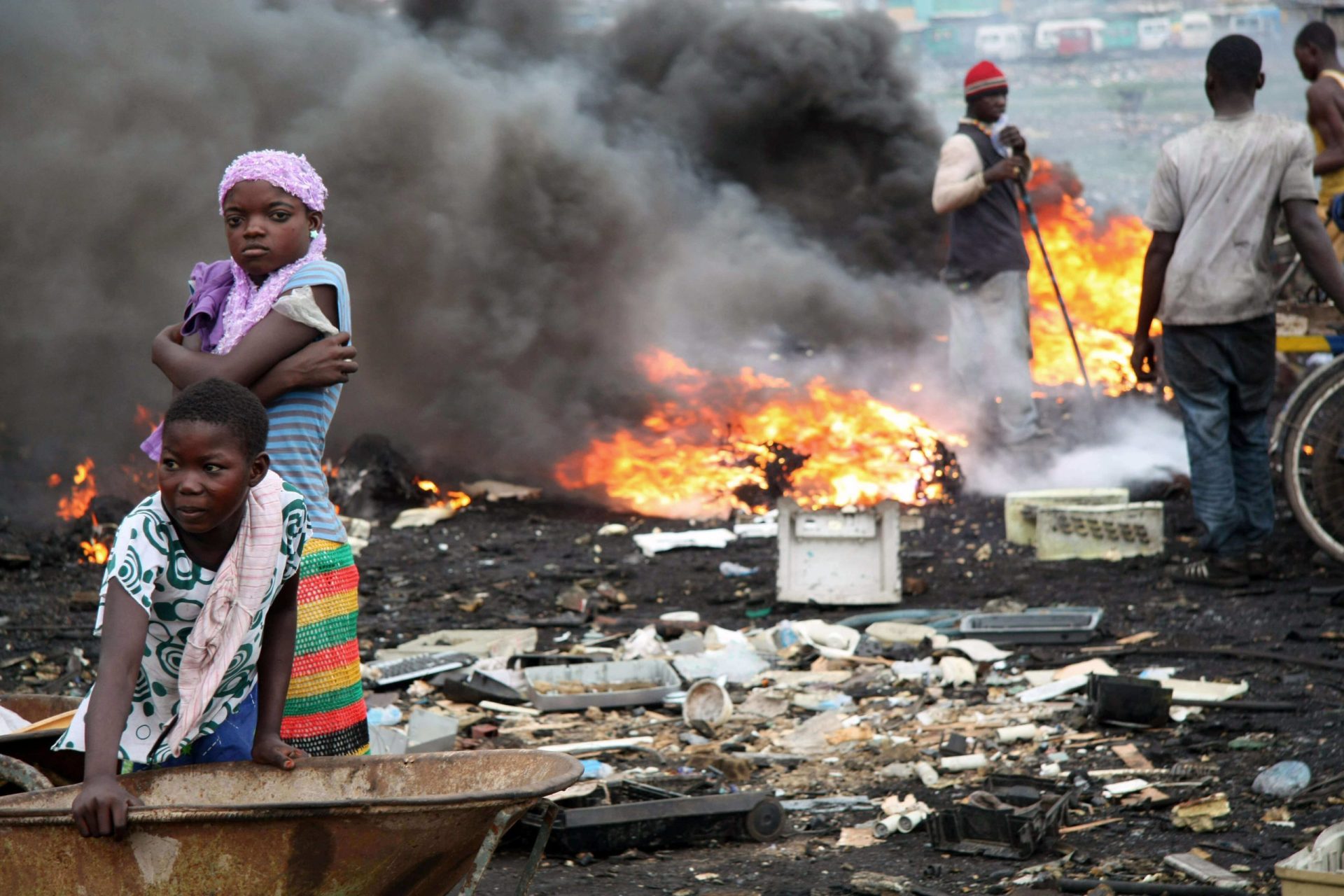
FOR IMMEDIATE RELEASE
Change and Hope Comes To Agbogbloshie: One of West Africa’s Largest E-waste Dump Begins Transformation to Model Recycling Center
October 22, 2014–A celebration marked the opening of the new e-waste recycling facility in Agbogbloshie, Accra, Ghana. Dignitaries, dancers, performing school children and a balloon archway stood out in sharp contrast in this sooty, trash-strewn landscape. This collaborative effort to transform Agbogbloshie from one of West Africa’s largest e-waste dumps into a model recycling center was launched on October 9, 2014 by Blacksmith Institute for a Pure Earth, a New York-based non-profit, with local partners Green Advocacy Ghana (GreenAd) and the Greater Accra Scrap Dealers Association (GASDA).
The start-up of the new e-waste recycling facility includes four automated wire-stripping units, housed in repurposed bright blue shipping containers, staffed with newly trained workers. These new machines can strip or pull apart plastic coated cables and wires of various sizes, scavenged from the e-waste dump, to extract copper and other valuable materials without burning.
See photos; Read about the opening in The Pollution Blog; Learn about the project
“It took a while to hit on a method that appealed to the informal recyclers here in Agbogbloshie”, said Dr. Jack Caravanos, CUNY professor and research lead at Pure Earth, who started visiting and assessing worker’s health and the environmental devastation in Agbogbloshie in 2008. “There are so many toxic chemicals and heavy metals contaminating this region, but it was clear that the most urgent intervention was to provide an alternative to the burning of plastic coating on scavenged wires.”
Caravanos explained, “First we proposed an elevated burning platform to reduce the flow of toxins into the soil and water, but realized this approach wouldn’t have much impact. In 2010, we rigged up a manual wire-stripping unit, which was cumbersome and not widely embraced by recyclers. Finally, we found the mechanized wire-stripping units, tested them out with partners and recyclers, made modifications based on their feedback, and started planning the new center.”
Next, GreenAd and GASDA developed the pricing structures and market incentives attractive enough to convince e-waste workers that coming to the center, stripping the wire coating rather than burning, would bring them greater income.
The new facility is expected to be able to extract about 10 tons of copper per month from e-waste. GASDA will use some of the profits to maintain the facilities and machines.
“Burning e-waste was and still is, to many, the established way of working here. That is why we are grateful to see so much support from the recyclers and residents of Agbogbloshie for this new recycling facility,” said Yaw Amoyaw-Osei, Founder/Executive Director of GreenAd, one of Blacksmith/Pure Earth’s partners on the project.
“There was a lot of distrust initially. We had to convince the recyclers that we did not want to take away their livelihoods…They are aware of the hand they deal themselves,” according to Amoyaw-Osei.
“We did a health exposure survey and found serious anomalies. There were such elevated levels of heavy metals. We couldn’t believe it. But when we met and discussed all this with the recyclers, they told us that they have 20,000 people depending on them here. They must survive.”
Once additional funds have been secured, the project will scale up in 2015.
“We are hoping to increase number of wire-stripping and other types of machines,” said Kira Traore, Program Director for Africa at Blacksmith Institute for a Pure Earth. “The trained workers will use appropriate machines to cleanly disassemble the materials and directly export the metals, plastics, and other saleable items. In this way, recyclers will maintain profits without polluting, and trained workers will increase profits by being in direct contact with exporters and selling clean materials that have not been burned.”
Traore added, “Everyone is talking about how this is just the beginning. I think we are seeing a real commitment to changing the e-waste recycling industry in Ghana.”
The overflowing crowd at the opening reflects the strong community support for the project. The celebration was attended by local dignitaries including the Deputy Minister of the Environment, the Director of the EPA, and representatives from the World Bank, UNDP, UNIDO, GIZ, GRATIS Foundation, ProLink, the National Youth Authority, the Ministry of Energy, the Ministry of Trade and Industry, Ghana Health Service, the national Ghana electric company, and many others.
“Over the years we have gotten to know our local partners and the recyclers very well. This collaboration is an example of how we work, and why our projects succeed, because we listen, and keep trying until we get it right,” said Richard Fuller, President of Blacksmith Institute for a Pure Earth.
Support for the project comes from the European Commission and the United Nations Industrial Development Organization (UNIDO) through the Global Alliance for Health and Pollution (GAHP), with additional funding for scaling up the project from Addax and Oryx Foundation. The National Youth Authority donated use of the land for the recycling center, with additional support from the Ministry of Environment and Ghana’s EPA, Ghana Health Services, and the Comic Relief Fund.
Contact:
- Angela Bernhardt, [email protected]
- Magdalene Sim, [email protected]





